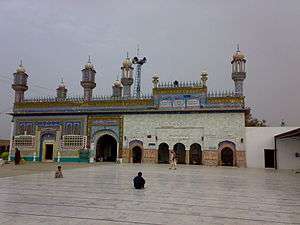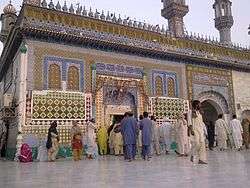Sultan Bahu
| Sultan Bahu | |
|---|---|
 Shrine of Sultan Bahu | |
| Native name | سُلطان باہُو |
| Born |
17 January 1630 Shorkot, Punjab (now Pakistan) |
| Died |
1 March 1691 Jhang, Punjab |
| Resting place | Garh Maharaja, Punjab |
| Education | Marifat |
| Known for | Sufism, poetry |
| Predecessor | Abdul Rehman Jilani Dehlvi |
| Successor | Syed Mohammad Abdullah Shah Madni Jilani |
Part of a series on Islam Sufism |
|---|
|
|
List of sufis |
|
|
Sultan Bahu (Urdu: سُلطان باہُو; also spelled Bahoo; ca 1630–1691) was a Sufi mystic, poet, and scholar active mostly in the present-day Punjab province of Pakistan. He belonged to Qadiri Sufi order, and founded the mystic tradition known as Sarwari Qadiri.
Little is known about Bahu's life, other than what is written in a hagiography called Manaqib-i Sultani, which was written by one of Bahu's descendants seven generations after Bahu's own time.[1] Sultan Bahu was born in Shorekot, Jhang, in the current Punjab Province of Pakistan. More than forty books on Sufism are attributed to him (mostly written in Persian), largely dealing with specialised aspects of Islam and Islamic mysticism.[2] However, it was his Punjabi poetry which had popular appeal and earned him lasting fame.[1]:14 His verses are sung in many genres of Sufi music, including qawwali and kafi, and tradition has established a unique style of singing his couplets.
Education
Sultan Bahu's first teacher was his mother, Mai Rasti. She pushed him to seek spiritual guidance from Hazrat Shah Habib Gilani, whose shrine still remains in the village of Bagdad Shareef[lower-alpha 1], near Mian Channu, to this day.
Around 1668, Sultan Bahu moved to Delhi for further training under the guidance of Syed Abdul Rehman Jilani Dehlvi, a notable Sufi saint of the Qadiriyya order, and thereafter returned to Punjab where he spent the rest of his life.
Literary works
The exact number of books written by Sultan Bahu is not known, but it is assumed to be at least one hundred. Forty of them are on Sufism and Islamic mysticism. Most of his writings are in the Persian Language except Abyat-e-Bahoo which is written in Punjabi verse.[3] Only the following books written by Sultan Bahu can be found today.
- Abyat e Bahu
- Risala e Ruhi
- Sultan ul Waham
- Nur ul Huda
- Aql e Baidar
- Mahq ul Faqr
- Aurang e Shahi
- Jami ul Israr
- Taufiq e Hidiyat
- Kalid Tauheed
- Ain ul Faqr
- Israr e Qadri
- Kaleed e Jannat
- Muhqam ul Faqr
- Majalis un Nabi
- Muftah ul Arifeen
- Hujjat ul Israr
- Kashf ul Israar
- Mahabat ul Israr
- Ganj ul Israr
- Fazl ul Liqa
- Dewaan e Bahu
Spiritual lineage
In his writings, Sultan Bahu refers to Abdul Qadir Jilani as his spiritual master, even though Jilani died long before the birth of Sultan Bahu. However, most Sufis maintain that Abdul Qadir Jilani plays a special role in the mystic world and that all orders and saints are forever indebted to him in some way either directly or indirectly.[4] While acknowledging that he is a follower of Jilani's Qadiriyya tradition, Sultan Bahu initiated an offshoot of his own which he named Sarwari Qadiri. The Awan tribe of Pakistan claim he belonged to the Alvi Awan tribe.[5]
Bahu's Sarwari Qadiri tradition (or Sufi order) is similar in its overall philosophy to the Qadiri order. Unlike many other Sufi orders, the Sarwari Qadiri tradition does not prescribe a specific dress code, ascetic practices, breathing exercises, etc. Instead, it focuses on practicing mental exercises, an important one, being the visualisation of the word الله (Allah, God) as written on one's own heart.
According to tradition, the lineage reaches Sultan Bahu as follows:
- Mohammad
- Ali ibn Abi Talib
- Hasan al Basri
- Habib al Ajami
- Dawud Tai
- Maruf Karkhi
- Sirri Saqti
- Junaid Baghdadi
- Abu Bakr Shibli
- Abdul Aziz bin Hars bin Asad Yemeni Tamimi
- Abu Al Fazal Abdul Wahid Yemeni Tamimi
- Mohammad Yousaf Abu al-Farah Tartusi
- Abu-al-Hassan Ali Bin Mohammad Qureshi Hankari
- Abu Saeed Mubarak Makhzoomi
- Abdul Qadir Jilani
- Abdul Razzaq Jilani
- Abdul Jabbar Jilani
- Syed Mohammad Sadiq Yahya
- Najm-ud-Din Burhan Puri
- Abdul Fattah
- Abdul Sattar
- Abdul Baqqa
- Abdul Jaleel
- Syed Abdul Rehman Jilani Dehlvi
- Sultan Bahu
The Sultan Bahu tradition is still practiced to this day by Sultan Bahu's successors.
Shrine

The shrine of Sultan Bahu is located in Garh Maharaja, Punjab.[6] It was originally built on Bahu's gravesite until the Chenab River changed its course causing the need to relocate twice and, in fact, Bahu's remains were probably swept away.[6] It is a popular Sufi shrine, and the annual Urs festival commemorating his death is celebrated there with great fervor on the first Thursday of Jumada al-Thani month. People come from far off places to join the celebrations.[7]
Sultan Bahu also used to hold an annual Urs to commemorate the martyrs of Karbala from the 1st to the 10th day of the month of Muharram. This tradition continues to this day and every year, thousands of pilgrims visit the shrine during the first 10 days of Muharram.
See also
References
- 1 2 Sult̤ān Bāhū (1998). Death Before Dying: The Sufi Poems of Sultan Bahu. University of California Press. ISBN 978-0-520-92046-0.
- ↑ Syed Ahmad Saeed Hamadani. Sultan Bahu Life & Work.
- ↑ Sultan Hamid Ali,"Manaqib-i Sultani" Malik Chanan Din Publishers (Regd) Lahore Pakistan 1956
- ↑ S. Padam, Piara (1984) [1st. Pub. 1984]. Dohrhe Sultan Bahu. s. n.
- ↑ Encyclopaedia of Untouchables Ancient, Medieval and Modern - Raj Kumar - Google Books
- 1 2 Sadia Dehlvi (2013-12-01). Sufism: Heart of Islam. HarperCollins Publishers. pp. 185–. ISBN 978-93-5029-448-2.
- ↑ Book Name: Tareekh-e-Jhang, Author: Iqbal Zuberi, Publisher: Jhang Adibi Academy, Jhang Sadar, Pakistan, First Edition, Date: 2002